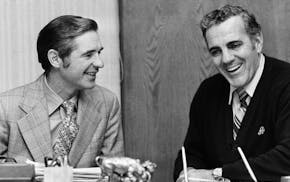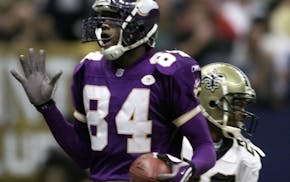The special session for a Vikings stadium is off for now, thanks to a Legislature that opposes one. A lot of people in that Legislature are insisting that an increase in sales tax in Ramsey County can't happen without a public vote in a referendum, something the Vikings oppose.
Here's a suggestion. With all the talk about referendums, why not have the citizens of the state vote on whether to expand state-owned gambling to include racinos?
It is a cinch to pass, and you would not only raise enough money for the stadium, but there would be money left over to improve funds for schools, roads, etc.
Rep. Linda Runbeck, R-Circle Pines, chairs the House Property and Local Tax Division Committee in the Legislature. She is quoted as saying that there's a growing sense in the House that there's no emergency when it comes to getting a Vikings stadium bill done.
Apparently she must know somebody involved with the NFL who's telling her the Vikings can't move even though their lease expires in a few months.
Just being realistic, Ms. Runbeck and all of her genius partners in St. Paul, but if you were the Wilf family, would you rather own an NFL franchise in Los Angeles or in the Twin Cities? In L.A., the Lakers get more than twice as much for tickets and suites than the Timberwolves get here, and the area's Fortune 500 companies would fight for the right to buy suites and tickets for their customers.
A clear example of the discrepancy between the two markets is that the Lakers franchise is worth more than $1 billion while the Wolves are worth no more than $400 million.
So if I was Zygi Wilf and owned the Vikings, I would sit back, insist to other NFL owners that I couldn't get a stadium here and also couldn't even break even in the 30-year-old Metrodome, and move to Southern California, where overnight I would go from a team in the small-market Twin Cities to having one of the most valuable franchises in the league.
A franchise that is worth about $600 million here would overnight be worth more than $1 billion in Los Angeles.
Teams do move On another subject, Ms. Runbeck, I doubt you know much about the history of franchises moving, because if you did, you wouldn't make such a statement.
• In 1984, Baltimore Colts owner Robert Irsay, without a vote of NFL owners, backed a number of trucks to the team facility and moved the franchise to Indianapolis overnight.
• In 1994, the Los Angeles Rams, unhappy because they couldn't get a good stadium in Anaheim, Calif., relocated to St. Louis.
• In 1996, Browns owner Art Modell, rather than wait for a referendum on whether to expand taxes in Cleveland for funding improvements on a stadium, moved his team to Baltimore.
• Also in the mid-1990s, the Tampa Bay Buccaneers were in position to move to Baltimore before the Cleveland team did, but they stayed in Florida when owner Malcolm Glazer got the local government to help fund a stadium through an increase in sales tax.
And for your information, to all the Republicans who don't believe the Vikings can move after this season, because they don't have a new stadium or lease, they will have a choice of two temporary facilities -- the Los Angeles Coliseum, where the Rams and Raiders played and where Southern California plays now, or the 100,000-seat Rose Bowl in Pasadena -- that would serve as a home until the new downtown stadium is built, which the Los Angeles Council has approved and where ground will be broke in the near future.
This area lost the North Stars, who played in a Met Center building that cost $6 million, and paid dearly to get an NHL franchise back. Xcel Energy Center, home of the Wild, cost $130 million and part of it was paid for by a $65 million state loan to St. Paul. Minneapolis lost the Lakers in 1960 because there was not a building to play in. So Target Center was built at a cost of $104 million to get the NBA back here three decades later.
Furthermore, according to the Vikings, the team generates some $20 million per season in tax revenue, including $12 million to $13 million in income tax each year from team employees and players as well as $1 million in income tax from visiting players.
In 2009, the Minnesota Sports Facilities Commission, which runs the Metrodome, published a report that estimated that the four professional sports teams in the state of Minnesota tallied a total of $458.7 million in tax revenue from 1961 to 2009. That money went to the state of Minnesota, Hennepin County, Minneapolis, St. Paul and the five-county transit system. Of that $458.7 million, the greatest tax revenue contributor was estimated to be the Vikings at $170.2 million. On top of that, the combined public investment in all sports facilities at the time was a mere $191 million, meaning the Vikings contributed nearly as much tax revenue on their own as the public paid into all four sports' facilities.
Jottings • The word is that the Twins will concentrate on re-signing Michael Cuddyer and Joe Nathan in the early free-agent signing period over Jason Kubel. ... Twins first baseman Justin Morneau was wearing a cast from his left wrist to his elbow after having surgery right after the season. The cast came off this week. Incidentally, Morneau is such a hockey fan that the word is the native Canadian was in Winnipeg when the Manitoba city brought the NHL back to town.
• Twins owner Jim Pohlad, Minneapolis Mayor R.T. Rybak and Hennepin County Commissioner Mike Opat intend to deliver the Twin Cities' official bid to the 2014 All-Star Game to Commissioner Bud Selig before the end of the year.
• In a blowout loss to the Lions on Sunday, Broncos receiver Eric Decker seemed to find a better rhythm with second-year starter Tim Tebow, grabbing six receptions for 72 yards and a touchdown. In Tebow's first start of the season for Denver, a 18-15 overtime victory at Miami on Oct. 23, Decker caught only two balls for 21 yards.
• You wonder how Gophers football would have changed had Charlie Strong been hired when he interviewed at the Bierman Building the day before Tim Brewster was announced as coach. Strong just signed a seven-year contract with Louisville after taking the Cardinals to their first bowl game in three years and was named co-Big East Coach of the Year last season. Maybe money was the reason Strong wasn't considered for the job here, since in his new contract he got a raise from $1.6 million to $2.3 million.
Sid Hartman can be heard weekdays on WCCO AM-830 at 6:40, 7:40 and 8:40 a.m. and on Sundays at 9:30 a.m. • shartman@startribune.com

Sid Instant Replay from 1977: Vikings' Super Bowl loss to Raiders hurt the most

Read Sid's column from 1974, when Ara Parseghian left Notre Dame

Sid instant replay: No greater hero than Twins' Morris in World Series


